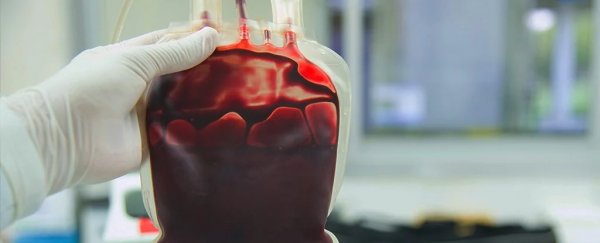Some people experiencing debilitating long COVID symptoms have spent tens of thousands of euros traveling across Europe to access a 'bloodwashing' procedure that is experimental and unproven.
'Bloodwashing', or apheresis, involves extracting a person's blood, filtering the blood to remove lipids and inflammatory proteins, and reinfusing it back into the body.
The German Society of Nephrology considers apheresis an option of last resort for people with untreatable lipid disorders. There have been no clinical trials on people with long COVID, and experts say the scientific rationale for the treatment is shaky.
Apheresis carries risks of bleeding, clotting, infection, and reactions to agents used in the procedure.
An investigation by Madlen Davies at the British Medical Journal found that one patient from the Netherlands spent nearly her entire life savings traveling to Cyprus for a 'bloodwashing' procedure that offered no improvement in her symptoms
The Dutch woman caught SARS-CoV-2 in November 2020 and experienced such extreme fatigue that it took her two hours to walk to the kitchen.
She experienced brain fog, heart palpitations, shortness of breath, and chest pain. A series of medical tests revealed nothing unusual, which is normal for long COVID.
The Dutch woman left her job in November 2021 after trying to go back to work twice. She joined a Facebook group for people with long COVID and saw a lot of chatter about a clinic in Germany that was offering apheresis.
Deciding to try the procedure, she traveled to the "Long COVID Center" in Cyprus in March 2022.
She rented an apartment on the beach and spent two months undergoing six rounds of apheresis at €1,685 (US$1,697) a piece.
While in Cyprus, she underwent nine rounds of hyperbaric oxygen therapy, where the patient breathes oxygen in a high-pressure chamber. She also tried an intravenous vitamin drip and a vitamin D injection.
Nothing helped. The so-called treatments plundered her savings with nothing to show for it.
There are clinics in Germany, Switzerland, and Turkey that offer apheresis for long COVID. The Lipid Center North Rhine in Germany has done the procedure on thousands of patients and claims to have good outcomes.
Apheresis supposedly reduces the stickiness of the blood and improves circulation in the smallest of blood vessels by removing microclots in people with long COVID.
Those offering the treatment argue that patients cannot wait for years for clinical trials to be completed when they have such disabling conditions and there the benefits of experimental procedures outweigh the risks for some patients.
However, there is no published and peer-reviewed research showing that apheresis helps treat long COVID.
"As we don't know how they form, we cannot tell if this treatment will stop microclots from recurring," Robert Ariens, a professor of vascular biology at the University of Leeds School of Medicine, said.
"[Microclots] may be a biomarker for disease, but how do we know they are causal?" he said. "If we don't know the mechanisms by which the microclots form and whether or not they are causative of disease, it seems premature to design a treatment to take the microclots away, as both apheresis and triple anticoagulation are not without risks, the obvious one being bleeding."
Anticoagulation can cause bruising, nosebleeds, and brain hemorrhages, so patients need long-term follow-up, which is challenging if they are receiving care in a country other than the one they normally live.
Long COVID is defined by the WHO as ongoing symptoms that continue for more than three months after COVID-19 that last for at least two months and cannot be explained by an alternative diagnosis.
The cause of long COVID is still unknown. One of the leading theories is that long COVID is caused by tiny blood clots in the lungs and blood vessels that gum up the system and prevent blood flow and oxygen transfer around the body.
Other theories hypothesize that long COVID is caused by a haywire immune system or the virus lingering in the body. Some experts think it could be a combination of all three.
This investigation was published in the British Medical Journal.
